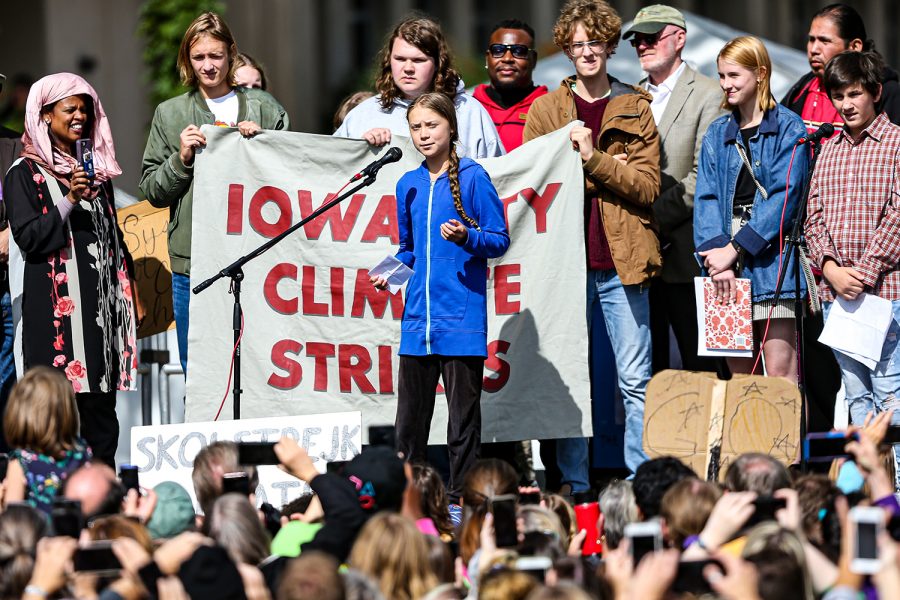Opinion | Persistence is the key to social justice
Activism takes many forms, but persistence is the key.
Swedish climate activist Greta Thunberg speaks at the Iowa City Climate Strike in downtown Iowa City on Friday, Oct. 4, 2019.
October 16, 2022
If you’re not angry, you’re not paying attention.
This is a sentiment felt by many young activists. Across the world, young people are increasingly outraged about the lack of action on urgent social issues like climate change, racial justice, and reproductive rights.
Feelings of anger are OK. It’s a sign you care about pressing issues. But how we advocate for social justice should not elicit more anger across the aisle. The best way to be an advocate is to agitate, not aggravate.
On Friday, climate activists with Just Stop Oil, a U.K.-based climate coalition, gained national attention after throwing a can of Heinz tomato soup on the famous painting “Sunflowers” by Vincent Van Gogh at London’s National Gallery.
The activists proceeded to glue themselves to the wall below the painting, and one shouted, “What is worth more, art or life? … Are you more concerned about the protection of a painting or the protection of our planet?”
When it comes to garnering national attention, the coalition succeed. But the conversations surrounding the incident are mixed.
While the purpose of the demonstration was to gain attention for their cause, many struggle to understand how these drastic actions relate to activism.
Similar conversations were expressed in the summer of 2020 following the murder of George Floyd.
After Floyd’s murder, cities across America experienced vandalism from protesters and counter-protesters. At the University of Iowa, cleanup following racial justice protests totaled over $1 million.
I strongly believe activism should not be passive and compliant. Change will not come from posting infographics on your Instagram story or watching a documentary on Netflix.
Meaningful change happens when you leave your comfort zone and put in the work to find justice. But justice is not found in the destruction of property or violence. The best way to be an advocate is to agitate your oppressors, not aggravate them further.
One way to be an activist is to lobby your representatives. The notion, “think globally, act locally” is best applied here.
Seeking justice for social issues can be overwhelming, but change is not on the shoulders of a single individual. It’s on the backs of people in power.
Meaningful change doesn’t happen overnight. It takes time and energy and relies on the boldness of people around you. Speaking to representatives like local and state leaders can influence change in your community and inspire change in surrounding communities.
Activism must also be persistent. In the wake of injustice, people take their rage to the streets to demand change. But as time passes, so does the drive of activists. That’s why it’s imperative that activism does not get caught up in the moment because moments don’t last forever. Change is a process, and we must keep on demanding.
A prime example of this is the work of Greta Thunberg. In 2018, the 15-year-old climate activist began the movement Fridays for Future. This movement has spread across the world, with millions protesting climate injustice each Friday.
In the four years since the movement started, Thunberg gained global attention and was even named Time Magazine Person of the Year in 2019. Thunberg has raised millions of dollars for climate initiatives and furthered global conversations surrounding climate change.
I’m angry about the inaction of people in power, and you should be, too. It’s easy to make drastic actions in the heat of the moment. But going out on the streets and staying persistent for social justice is hard.
As social justice activists, we must fight in the long run. Agitating people in power is the best way to advocate for change; aggravating and throwing soup will do more harm than good.
Columns reflect the opinions of the authors and are not necessarily those of the Editorial Board, The Daily Iowan, or other organizations in which the author may be involved.



